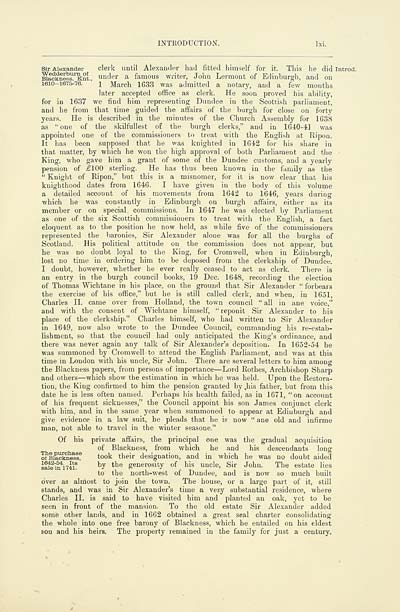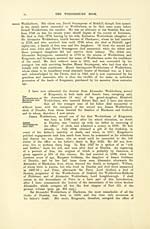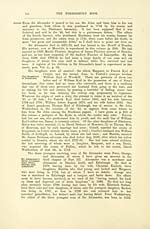Wedderburn book > History
(69) Page lxi
Download files
Complete book:
Individual page:
Thumbnail gallery: Grid view | List view

INTRODUCTION". lxi.
Sir Alexander clerk until Alexander had fitted himself for it. This he did introd.
Biacknes^Knt., under a famous writer, John Lermont of Edinburgh, and on
1610—1675-76. i March 1633 was admitted a notary, and a few months
later accepted office as clerk. He soon proved his ability,
for in 1637 we find him representing Dundee in the Scottish parliament,
and he from that time guided the affairs of the burgh for close on forty
years. He is described in the minutes of the Church Assembly for 163S
as " one of the skilfullest of the burgh clerks," and in 1640-4] was
appointed one of the commissioners to treat with the English at Ripon.
It has been supposed that he was knighted in 1642 for his share in
that matter, by which he won the high approval of both Parliament and the
King, who gave him a grant of some of the Dundee customs, and a yearly
pension of £100 sterling. He has thus been known in the family as the
" Knight of Ripon," but this is a misnomer, for it is now clear that his
knighthood dates from 1646. I have given iu the body of this volume
a detailed account of his movements from 1642 to 1646, years during
which he was constantly in Edinburgh on burgh affairs, either as its
member or on special commissions. In 1647 he was elected by Parliament
as one of the six Scottish commissioners to treat with the English, a fact
eloquent as to the position he now held, as while five of the commissioners
represented the baronies, Sir Alexander alone was for all the burghs of
Scotland. His political attitude on the commission does not appear, but
he was no doubt loyal to the King, for Cromwell, when in Edinburgh,
lost no time in ordering him to be deposed from the clerkship of Dundee.
I doubt, however, whether he ever really ceased to act as clerk. There is
an entry in the burgh council books, 19 Dec. 1648, recording the election
of Thomas Wichtane in his place, on the ground that Sir Alexander " forbears
the exercise of his office," but he is still called clerk, and when, in 1651,
Charles II. came over from Holland, the town council " all in ane voice,"
and with the consent of Wichtane himself, "reponit Sir Alexander to his
place of the clerkship." Charles himself, who had written to Sir Alexander
in 1649, now also wrote to the Dundee Council, commanding his re-estab-
lishment, so that the council had only anticipated the King's ordinance, and
there was never again any talk of Sir Alexander's deposition. In 1652-54 he
was summoned by Cromwell to attend the English Parliament, and was at this
time in London with his uncle, Sir John. There are several letters to him among
the Blackness papers, from persons of importance — Lord Rothes, Archbishop Sharp
and others — which show the estimation in which he was held. Upon the Restora-
tion, the King confirmed to him the pension granted by, his father, but from this
date he is less often named. Perhaps his health failed, as in 1671, "on account
of his frequent sicknesses," the Council appoint bis son James conjunct clerk
with him, and in the same year when summoned to appear at Edinburgh and
give evidence in a law suit, he pleads that he is now " ane old and infirme
man, not able to travel in the winter seasone."
Of his private affairs, the principal one was the gradual acquisition
of Blackness, from which he and his descendants long
o^Biackness? took their designation, and in which he was no doubt aided
saiein 4 i74i? ^y ^e g ener0Slt y of his uncle, Sir John. The estate lies
to the north-west of Dundee, and is now so much built
over as almost to join the town. The house, or a large part of it, still
stands, and was in Sir Alexander's time a very substantial residence, where
Charles II. is said to have visited him and planted an oak, yet to be
seen in front of the mansion. To the old estate Sir Alexander added
some other lands, and in 1662 obtained a great seal charter consolidating
the whole into one free barony of Blackness, which he entailed on his eldest
son and his heirs. The property remained in the family for just a century.
Sir Alexander clerk until Alexander had fitted himself for it. This he did introd.
Biacknes^Knt., under a famous writer, John Lermont of Edinburgh, and on
1610—1675-76. i March 1633 was admitted a notary, and a few months
later accepted office as clerk. He soon proved his ability,
for in 1637 we find him representing Dundee in the Scottish parliament,
and he from that time guided the affairs of the burgh for close on forty
years. He is described in the minutes of the Church Assembly for 163S
as " one of the skilfullest of the burgh clerks," and in 1640-4] was
appointed one of the commissioners to treat with the English at Ripon.
It has been supposed that he was knighted in 1642 for his share in
that matter, by which he won the high approval of both Parliament and the
King, who gave him a grant of some of the Dundee customs, and a yearly
pension of £100 sterling. He has thus been known in the family as the
" Knight of Ripon," but this is a misnomer, for it is now clear that his
knighthood dates from 1646. I have given iu the body of this volume
a detailed account of his movements from 1642 to 1646, years during
which he was constantly in Edinburgh on burgh affairs, either as its
member or on special commissions. In 1647 he was elected by Parliament
as one of the six Scottish commissioners to treat with the English, a fact
eloquent as to the position he now held, as while five of the commissioners
represented the baronies, Sir Alexander alone was for all the burghs of
Scotland. His political attitude on the commission does not appear, but
he was no doubt loyal to the King, for Cromwell, when in Edinburgh,
lost no time in ordering him to be deposed from the clerkship of Dundee.
I doubt, however, whether he ever really ceased to act as clerk. There is
an entry in the burgh council books, 19 Dec. 1648, recording the election
of Thomas Wichtane in his place, on the ground that Sir Alexander " forbears
the exercise of his office," but he is still called clerk, and when, in 1651,
Charles II. came over from Holland, the town council " all in ane voice,"
and with the consent of Wichtane himself, "reponit Sir Alexander to his
place of the clerkship." Charles himself, who had written to Sir Alexander
in 1649, now also wrote to the Dundee Council, commanding his re-estab-
lishment, so that the council had only anticipated the King's ordinance, and
there was never again any talk of Sir Alexander's deposition. In 1652-54 he
was summoned by Cromwell to attend the English Parliament, and was at this
time in London with his uncle, Sir John. There are several letters to him among
the Blackness papers, from persons of importance — Lord Rothes, Archbishop Sharp
and others — which show the estimation in which he was held. Upon the Restora-
tion, the King confirmed to him the pension granted by, his father, but from this
date he is less often named. Perhaps his health failed, as in 1671, "on account
of his frequent sicknesses," the Council appoint bis son James conjunct clerk
with him, and in the same year when summoned to appear at Edinburgh and
give evidence in a law suit, he pleads that he is now " ane old and infirme
man, not able to travel in the winter seasone."
Of his private affairs, the principal one was the gradual acquisition
of Blackness, from which he and his descendants long
o^Biackness? took their designation, and in which he was no doubt aided
saiein 4 i74i? ^y ^e g ener0Slt y of his uncle, Sir John. The estate lies
to the north-west of Dundee, and is now so much built
over as almost to join the town. The house, or a large part of it, still
stands, and was in Sir Alexander's time a very substantial residence, where
Charles II. is said to have visited him and planted an oak, yet to be
seen in front of the mansion. To the old estate Sir Alexander added
some other lands, and in 1662 obtained a great seal charter consolidating
the whole into one free barony of Blackness, which he entailed on his eldest
son and his heirs. The property remained in the family for just a century.
Set display mode to:
![]() Universal Viewer |
Universal Viewer | ![]() Mirador |
Large image | Transcription
Mirador |
Large image | Transcription
Images and transcriptions on this page, including medium image downloads, may be used under the Creative Commons Attribution 4.0 International Licence unless otherwise stated. ![]()
| Histories of Scottish families > Wedderburn book > History > (69) Page lxi |
|---|
| Permanent URL | https://digital.nls.uk/95651547 |
|---|
| Attribution and copyright: |
|
|---|---|
| Description | A selection of almost 400 printed items relating to the history of Scottish families, mostly dating from the 19th and early 20th centuries. Includes memoirs, genealogies and clan histories, with a few produced by emigrant families. The earliest family history goes back to AD 916. |
|---|

